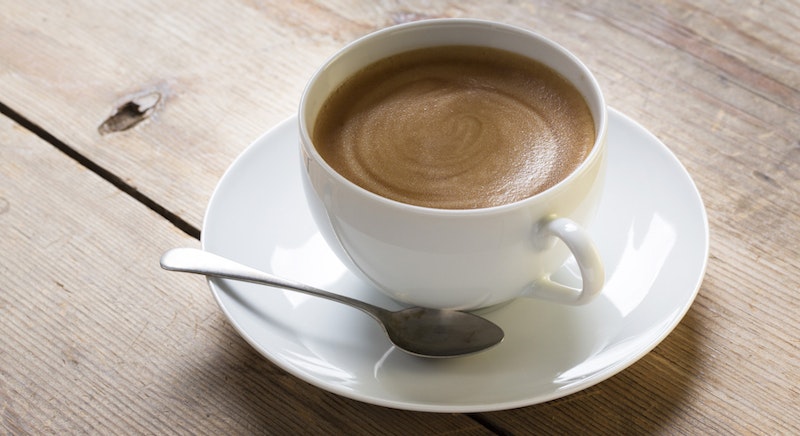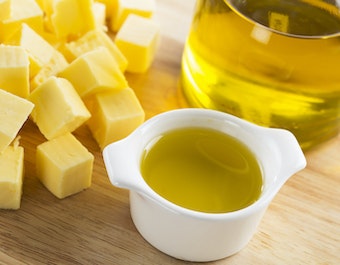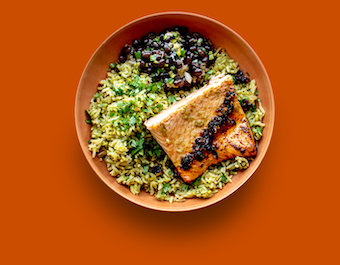The hottest thing out of Silicon Valley right now isn’t a “Facebook killer” or “the next Uber for whatever.” It’s buttered coffee. And everyone — from startup geeks to elite athletes and Hollywood celebs — is touting its alleged powers to rev up your energy and sharpen your mind.
Putting butter in a hot drink isn’t exactly a new thing. Tibet’s famous yak-butter tea was actually an inspiration for the current fad. Tibetans drink cup after cup of the stuff in their high, cold mountain homes, but Tibetan tea is savory, more like a thin soup, and definitely an acquired taste.
The best known of the buttered coffee brands is Bulletproof Coffee, invented by tech entrepreneur and self-proclaimed “biohacker” Dave Asprey. The concoction is a blend of two cups of special Bulletproof “upgraded” coffee, one to two tablespoons of “Brain Octane” (a special coconut-oil extract high in easily digested fats called medium-chain triglycerides, or MCTs), and at least two tablespoons of melted, unsalted butter from grass-fed cows.
Blend all that together until frothy, and drink as your breakfast. People say it actually tastes pretty good — like a creamy cappuccino.
Asprey claims that the 450-calorie brew cuts hunger, promotes weight loss, and sharpens mental clarity. In his book The Bulletproof Diet, he suggests you can lose a pound a week just by swapping breakfast for this brew. Along with a diet that’s as much as 70 percent fat, Asprey credits buttered coffee with helping him transform from an overworked, 300-lb. executive with brain fog into a slim, highly efficient “superhuman” with six-pack abs.
Bulletproof isn’t the only buttered-coffee game in town. Other variations may use regular butter (grass-fed can be hard to find), ghee (clarified butter), regular coconut oil (which is still high in medium-chain fats), or even heavy whipping cream. You can find any number of recipes online, and you can buy a cup at a few cafes as well, under names like “Sherpa” or “Mammoth.”
But before you get your lips slick with oily coffee, let’s dig into the rather bold health claims.
Weight loss: Boosters claim the concoction helps you lose weight by keeping you feeling fuller for longer than a regular breakfast. It’s not an entirely baseless claim — some small studies suggest that medium-chain fats (the kind in coconut oil) may in fact help people feel full faster and possibly prevent weight gain, but results are inconsistent. No studies have looked at Bulletproof coffee specifically.
Many health experts aren’t buying the hype. Leigh Tracy, a registered dietitian at the Center for Endocrinology at Mercy Medical Center in Baltimore, is one. Like many nutrition experts, she questioned the practice of swapping a full breakfast for a high-fat drink.
“I would not consider buttered coffee as a healthy breakfast choice since it is high in saturated fat and calories,” Tracy says. “Bulletproof Coffee is not a nutritious breakfast. Focus more on eating a well-balanced breakfast.”
She may have a point. Many buttered coffee drinkers report feeling hungry all morning. Plenty of other foods provide a better mix of carbohydrates, protein, and fat. And speaking of fat, keep in mind that both coconut oil and butter are both high in saturated fat (a tablespoon of coconut oil has 12 grams, and the same amount of butter has 7 grams). The good news is that saturated fat in food may not be the heart-health villain it’s been painted to be, but three or four tablespoons of any fat is a lot of calories.
“Weight loss is really a matter of calories in versus calories out,” Tracy says. “Meaning, if you are burning more calories than you are consuming, you will lose weight. If you are more sedentary and are consuming more calories than needed, you will most likely gain weight.”
“One Bulletproof Coffee ranges from 231 to 461 calories, so it really depends on how the drink is prepared. If you choose to drink Bulletproof Coffee, aim to have the lower-calorie version.”
In other words, Asprey’s potent mixture isn’t going to be a magic bullet for dieters. Which brings us to the other main claim.
Mental clarity: This one is even trickier. Coffee itself helps with mental focus. But can swapping fat for a breakfast of carbs and protein really help the brain?
Here’s what we know: Unlike most other fats, the medium-chain fats in coconut oil break down easily in the body and form ketones, an alternate source of energy for the brain. Replacing a carb-rich breakfast with a coconut-fatty one could, in theory, prevent spikes in blood sugar and “brain fog” that many people feel after carb-heavy meals or sugary drinks. But oddly, there just isn’t much research on fats and their effects on the workings of healthy adult brains. We don’t know whether coconut oil — or Bulletproof Coffee — is good brain fuel.
What users say
So there’s no solid evidence that fatty coffee is either good or bad for you, and no studies to prove (or disprove) the claims of weight loss or mental focus. In the meantime, many are gathering data the old-fashioned way — trying it for themselves.
Kayla Donato, a Toronto-based real estate sales representative, became such a fervent fan of Bulletproof Coffee that she created an entire blog about it. After years of struggling with weight gain, restless sleep, and inflammation, Donato, 26, says she saw big changes.
“I found myself waking up at 6 am without an alarm and with zero grogginess,” she says. “My brain fog was gone after years of feeling cloudy. I have energy like never before. I have my zest for life back and I dropped the unwanted weight and inflammation that was making me miserable.”
Even a few nutrition experts are warming up to Bulletproof Coffee. Tamar Cohen, a holistic nutrition consultant in Oakland, California, helps clients manage their weight. She says she approached buttered coffee with “trepidation.” But when she tried it she noticed an uptick in her energy levels, and her morning runs became “effortless.”
Cohen also likes the fact that butter from pasture-raised or grass-fed cows can contain higher levels of omega-3s and CLA (conjugated linoleic acid), which are both beneficial fats. On the whole, she says that Bulletproof Coffee could provide “a good jump-start” for people looking to lose weight, especially if the drink replaces a less nutritious choice like a donut or sugary cereal. “It’s worth trying for people who have tried other diets that haven’t worked,” she says.
If you do decide to try it yourself, it might be a good idea to ramp up the oil and butter gradually to get your body used to using fat as fuel and prevent an upset stomach, a common complaint. It’s not cheap either — if you make it at home, a cup of Bulletproof Coffee runs about $2.
Bottom line: Maybe it works, maybe it doesn’t, but it could be a better option than many other creamy, sugary coffee drinks out there. Just take it with a (proverbial) grain of salt.
Editor: Deepi Brar
Read More:






